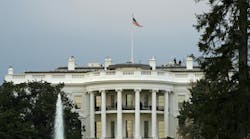The US has downplayed an Iranian offer of oil swaps with Iraq, saying no such arrangements are in place or even envisaged as a means of assisting in the reconstruction of the war torn country.
US Department of State spokesman Richard Boucher Oct. 27 said, "there is no such arrangement, no such swap arrangement with Iran at present. And as you know, we have a lot of concerns about Iranian behavior that would lead us to be concerned."
Boucher added that, "there would be issues that would have to be examined with regard to any such arrangement with Iran." But he did not detail what particular issues would have to be dealt with before any swap arrangement could take place.
Iranian Foreign Minister Kamal Kharrazi told the International Donors' Conference for the Reconstruction of Iraq, "We stand ready to supply our electricity and gas to Iraq and to facilitate its oil exports through our oil terminals or enter into a swap arrangement that can amount to 350,000 b/d [of oil]."
Kharrazi noted that Iran's Abadan refinery has the capacity to process 350,000 b/d of Iraqi oil. An oil swap arrangement would be designed to permit Baghdad to deliver that much crude across to Iran, while Tehran would export an equivalent volume of Iranian crude on Iraq's behalf from the Persian Gulf.
Swap details
Kharrazi said the swap offer is part of a "comprehensive package of economic cooperation comprising development aid, investment, trade, tourism, project financing, and so on."
The minister also outlined his country's plan to link its road and rail system with Iraq's in an effort to improve transportation between the two countries. "Provision of port facilities to provide Iraq with more access to the Persian Gulf and other trade and transit corridors all fall into this context," Kharrazi said.
Oil industry sources say Iran's offer for crude exports or a swap would help Baghdad boost its crude exports. Since the onset of the US-led war in March, Iraq's oil exports have been hampered by widespread sabotage of the country's crude facilities—especially the northern pipeline system, which delivers crude to the export terminal at Ceyhan, Turkey.
Proposals unwelcome
But analysts said Washington, DC, was unlikely to welcome the proposals. The US accuses Tehran of attempting to develop nuclear weapons and, more recently, of harboring members of the Al-Qaeda terrorist network and allowing them to use Iran as a base of operations in a campaign of guerrilla warfare against the US-led coalition forces in Iraq.
US President George W. Bush Oct. 28 blamed a wave of violence in postwar Iraq in part on "foreign terrorists," and said he expected Syria and Iran to enforce border controls to stop infiltrators.
Bush said the US was "working closely" with Iran and Syria, and added: "We expect them to enforce borders, prevent people from coming across borders if in fact we catch them doing that." He said coalition forces were also stepping up border enforcement efforts.
Iran Oct. 29 dismissed Bush's allegations that anti-American fighters were slipping across its borders into Iraq. Until Washington became more cooperative, Iran also said it would not share intelligence with the US about Al-Qaeda members it is currently holding.
Iran claims to have arrested more than 2,300 Islamic fighters since October 2001, saying it has deported most of them back to their own countries. United Nations sources confirmed Oct. 22 that Iran gave the UN Security Council's Al-Qaeda and Taliban Sanctions Committee a list of 240 alleged Al-Qaeda members that it continues to hold.
